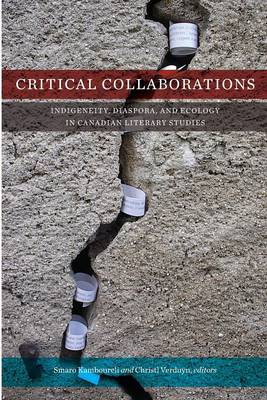
- Afhalen na 1 uur in een winkel met voorraad
- Gratis thuislevering in België vanaf € 30
- Ruim aanbod met 7 miljoen producten
- Afhalen na 1 uur in een winkel met voorraad
- Gratis thuislevering in België vanaf € 30
- Ruim aanbod met 7 miljoen producten
Zoeken
Critical Collaborations
Indigeneity, Diaspora, and Ecology in Canadian Literary Studies
€ 72,45
+ 144 punten
Omschrijving
Critical Collaborations: Indigeneity, Diaspora, and Ecology in Canadian Literary Studies is the third volume of essays produced as part of the TransCanada conferences project. The essays gathered in Critical Collaborations constitute a call for collaboration and kinship across disciplinary, political, institutional, and community borders. They are tied together through a simultaneous call for resistance--to Eurocentrism, corporatization, rationalism, and the fantasy of total systems of knowledge--and a call for critical collaborations. These collaborations seek to forge connections without perceived identity--linking concepts and communities without violating the differences that constitute them, seeking epistemic kinships while maintaining a willingness to not-know. In this way, they form a critical conversation between seemingly distinct areas and demonstrate fundamental allegiances between diasporic and indigenous scholarship, transnational and local knowledges, legal and eco-critical methodologies. Links are forged between Indigenous knowledge and ecological and social justice, creative critical reading, and ambidextrous epistemologies, unmaking the nation through translocalism and unsettling histories of colonial complicity through a poetics of relation. Together, these essays reveal how the critical methodologies brought to bear on literary studies can both challenge and exceed disciplinary structures, presenting new forms of strategic transdisciplinarity that expand the possibilities of Canadian literary studies while also emphasizing humility, complicity, and the limits of knowledge.
Specificaties
Betrokkenen
- Uitgeverij:
Inhoud
- Aantal bladzijden:
- 296
- Taal:
- Engels
- Reeks:
Eigenschappen
- Productcode (EAN):
- 9781554589111
- Verschijningsdatum:
- 13/05/2014
- Uitvoering:
- Paperback
- Formaat:
- Trade paperback (VS)
- Afmetingen:
- 152 mm x 226 mm
- Gewicht:
- 430 g

Alleen bij Standaard Boekhandel
+ 144 punten op je klantenkaart van Standaard Boekhandel
Beoordelingen
We publiceren alleen reviews die voldoen aan de voorwaarden voor reviews. Bekijk onze voorwaarden voor reviews.










